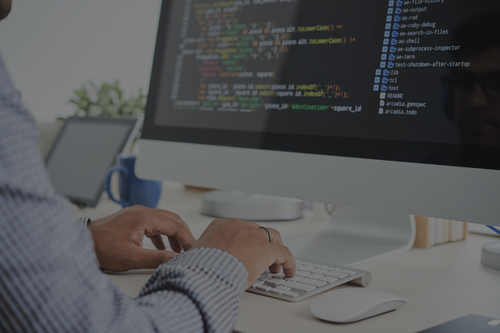AI in Recruitment: Transforming Hiring with Tailored Algorithms

The recruitment landscape is undergoing tremendous change. The significance of employing the appropriate personnel cannot be stressed as firms grow and diversify. Nonetheless, recruiters are frequently swamped with the number of job applications at an all-time high. How will they sift through hundreds of resumes to discover the best fit? Enter artificial intelligence-powered applicant screening.
Table Of Contents
The Current Challenge: Information Overload
According to recent data, a single corporate job opportunity generates an average of 250 applicants. For businesses, this figure might easily reach the thousands. Sifting through this massive volume used to take many hours, with no certainty of finding the appropriate applicant.
AI to the Rescue: How Custom Algorithms Are Changing the Game
Thanks to advances in artificial intelligence, custom algorithms can now swiftly analyze large volumes of data, ensuring only the most relevant individuals are shortlisted. Here’s how AI is making a difference:
- Keyword Matching: Beyond just simple keyword matching, AI can contextualize the relevance of a keyword to a particular job role, ensuring higher accuracy in candidate shortlisting.
- Pattern Recognition: AI identifies patterns in successful hires and uses this data to screen potential candidates, increasing the chances of a successful match.
- Skill Assessment: Through data analysis, AI can assess a candidate’s proficiency in a specific skill set, eliminating the bias often associated with manual screening.
- Culture Fit Evaluation: Using AI, it’s possible to gauge a candidate’s cultural fit within a company by analyzing their responses, profiles, and more, ensuring a harmonious workplace environment.
- Predictive Analytics: Some algorithms can forecast how long a candidate might stay with the company or their potential to succeed in a given role based on historical data.
Real-World Impact: AI’s Proven Efficacy
According to a HireVue survey, firms that employ AI-driven recruitment solutions may save screening time by up to 75%. This not only expedites the hiring process but also guarantees that the top candidates are not overlooked due to manual oversight.

Potential Concerns: Ethics and AI in Recruitment
While AI provides great efficiency, businesses must be wary of potential biases in algorithms. It is critical to constantly develop and test the software to ensure that it does not discriminate mistakenly based on gender, race, or other irrelevant variables.
The Advantages of Continuous Learning for AI Algorithms
AI’s brilliance does not end with its first skills; it lives on constant learning. This quality is especially important in recruiting, as trends, job scopes, and desirable abilities are always changing.
Dynamic Adaptation to Market Needs
AI-powered screening solutions with custom algorithms are meant to adapt. As market demands change and new abilities develop, these tools may adjust their requirements. For example, a sudden increase in remote work may prioritize applicants with demonstrated remote work skills or specialized digital tool proficiency. A flexible AI system would detect this transition and alter its screening settings accordingly.
Feedback Loop: Learning from Every Hire
Every cycle of recruiting gives a chance for AI systems to learn and improve their procedures. The system may re-calibrate its emphasis for future screenings by analyzing the performance and comments of recently recruited applicants. This feedback loop leads to a highly optimized recruitment process that consistently finds high-potential applicants over time.
Integrating with Other HR Tools
The modular nature of modern AI systems allows them to integrate seamlessly with other HR tools, from onboarding software to performance assessment tools. Such integration provides a holistic view of the candidate, right from the application phase to their performance several months into the job. This 360-degree feedback can be invaluable in refining recruitment algorithms further.
Cost Savings and Efficiency
It’s not just about finding the right candidate quickly; it’s also about resource optimization. By reducing the man-hours spent on initial screenings, companies can reallocate their HR resources more effectively. This results in not just monetary savings but also allows HR professionals to focus on more strategic, value-adding activities.
AI and the Evolution of Recruitment Metrics
In the modern recruitment landscape, metrics have shifted from mere numbers to insightful data that can predict future performance. AI’s introduction into the domain has considerably elevated these metrics.
Time-to-Hire: From Weeks to Days
Traditionally, the time-to-hire was a drawn-out process, often spanning several weeks. With AI-powered candidate screening, the initial phases of sorting and sifting through resumes have been accelerated exponentially. Recruiters no longer need to spend hours perusing through countless CVs. The system does it for them in mere seconds, pushing only the most relevant profiles for human review.
Enhancing Quality-of-Hire
Quality-of-hire has always been a somewhat nebulous metric, reliant on long-term performance reviews and feedback. However, AI, with its data-driven approach, offers a more immediate insight. By analyzing a candidate’s digital footprints, participation in online forums, published papers, and more, AI can paint a comprehensive picture of a candidate’s expertise and potential fit within a company’s culture.
The Rise of Predictive Analytics in Recruitment
Beyond immediate screening, AI tools equipped with predictive analytics can forecast a candidate’s potential success within a role. By cross-referencing a candidate’s profile with those of top-performing employees in similar roles, the system can predict the likelihood of a candidate excelling in a given position.
Reducing Unconscious Bias
Unconscious biases impacting decision-making have long been a major problem in manual recruiting procedures. When AI is developed appropriately, it provides a more unbiased viewpoint. These approaches guarantee that candidates are chosen entirely on their merits by concentrating on abilities, experience, and established track records, encouraging a more diverse and inclusive workforce.
Conclusion: Embracing the Future of Recruitment
Embracing AI in recruitment is reshaping the hiring landscape. With the rise of digital transformation, integrating custom algorithms has become pivotal. The blend of AI with ethical considerations guarantees a hiring process that’s transparent, efficient, and unbiased, setting a new standard for the future.






